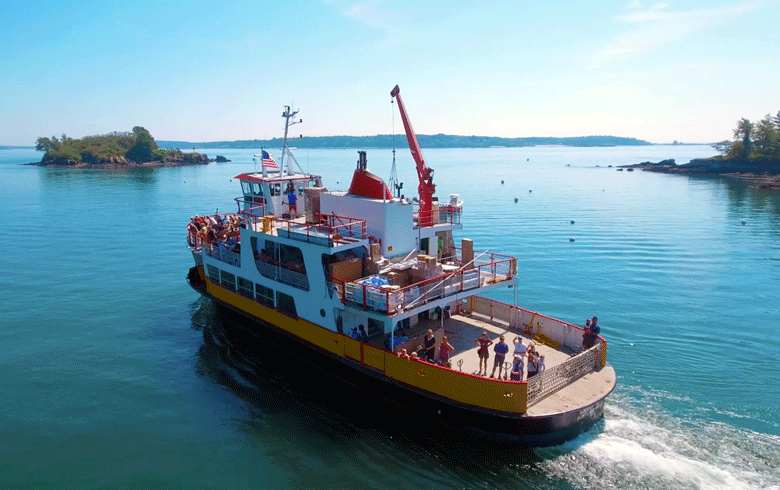The Casco Bay Island Transit District—known to most as the Casco Bay Lines that operates ferry service between Portland and a half-dozen islands in Casco Bay—has won a $3.6 million federal grant to help build a replacement for the aged Maquoit II which carries passengers and freight to the five “down bay” islands farthest from the mainland.
Casco Bay Lines applied for funding through the Federal Transit Administration’s Passenger Ferry Grant Program, which provides funding for projects that support passenger ferry systems in urbanized areas. FTA announced the $3.6 million award to the Portland-based ferry line in late February and Hank Berg, Casco Bay Lines’ General Manager, was delighted.
“This is a nationwide competitive grant,” Berg said shortly after the FTA announcement. “We submitted an application in late summer. We’re thrilled that a little old ferry service in Maine won this nationwide competition.”
The hybrid propulsion system will eliminate more than 1,000 metric tons of CO2 emissions annually…
Casco Bay Lines operates a fleet of five ferries that carry passengers, vehicles, and freight between the mainland terminal on Portland’s Commercial Street waterfront and six unbridged islands in the bay.
Maquoit II serves as the principal passenger and freight carrier to Chebeague, Cliff, Great Diamond, Little Diamond, and Long islands, sailing the nearly 50-mile daily round trip year-round. According to Berg, the 98-foot, twin diesel-powered ferry carried some 300,000 passengers annually in pre-pandemic times.
Including regular service to the year-round community on Peaks Island, primarily with the car ferry Machigone II, Casco Bay Lines carried about 1.1 million passengers annually, pre-pandemic.
Berg said the two ferries also carried some 500,000 pieces of freight annually to the six islands they serve.
Maquoit II is the second Casco Bay Lines ferry slated for replacement. Last year, Casco Bay Lines sought bids to build a modern replacement for the Machigone II. Plans called for construction of a 164-foot double-ended ferry capable of carrying 599 passengers and 15 cars, powered by a cutting-edge diesel-electric hybrid propulsion system that would substantially reduce emissions. The boat likely “could be the first public ferry to use this propulsion system,” Berg said.
Casco Bay Lines secured more than $16 million for the design and construction of the Machigone II replacement but the sole bid for the ferry came in substantially over the estimated $14.2 million cost and the project was place on hold.
Berg said Casco Bay Lines has since done “some cost reduction” and received additional FTA funding through the Portland Metro planning office as well as from the Maine Department of Transportation for the project.
“We hope to go out to bid again at the end of the month,” Berg said late in February.
The design of the Maquoit II replacement has yet to get under way. The existing ferry can carry 399 passengers plus “one or two” vehicles and “we probably don’t need a higher capacity,” Berg said. Current plans, though, do call for use of diesel-electric hybrid propulsion similar to that planned for the larger ferry. The boat would use diesel propulsion under way and battery power while in port.
Casco Bay Lines estimates that the planned hybrid propulsion system replacement will eliminate more than 1,000 metric tons of CO2 emissions annually over the vessel’s 30-year lifespan.
“It has been our hope, since we began the significant undertaking of replacing these two aging vessels, that we would have the opportunity to utilize this technology and reduce our climate impact in a meaningful way,” Berg said announcing the grant. “As we embark on the Maquoit replacement this grant makes it possible to double-down on our efforts.”
While the project will be financed, in part, with federal funding, Casco Bay Lines must use competitive bidding to select the designer for the new boat. The process itself will begin, Berg said, with extensive public consultations, especially with residents of the down bay islands to be served by the new ferry.
Berg said he hopes to have the design process for the newest boat well under way this coming winter with construction to begin in 2024 and delivery in 2026.





